Learning to Cook Up a Brighter Future in Brownsville
At the Community Culinary Center, students get a head start in the hospitality industry and the neighbors get some fine meals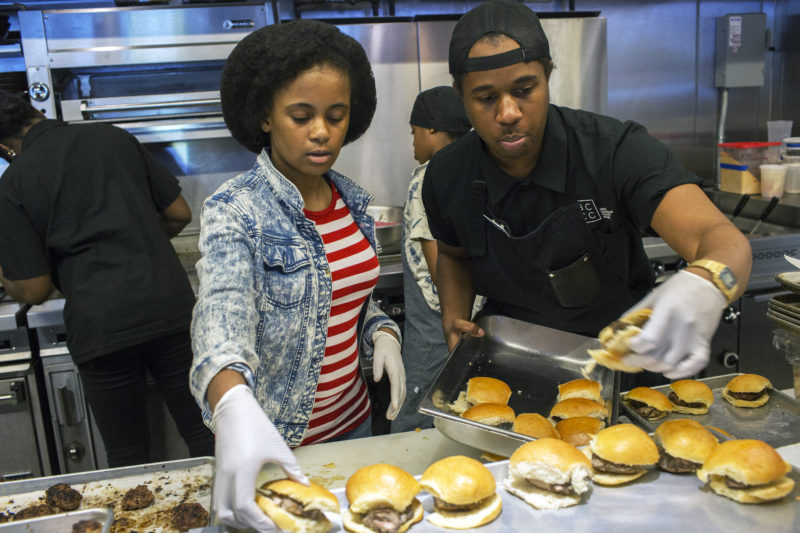
For a neighborhood celebration, BCCC students Chloe Hadley, left, and Travis Maxwell cooked jerk chicken and sliders (Photos by Andrew Lichtenstein)
On a Saturday afternoon in Brownsville when everyone expected it to rain, Barkim Webster stood in line with his son waiting for a hamburger slider. The burgers on the grill were not from a chain restaurant, however, but from a school, prepared by people from the neighborhood who were training to serve him.
Webster, 30, is not old enough to remember sit-down restaurant service in the area. It has been decades since such an establishment has operated here, Brownsville residents say. But that has changed, thanks to a new institution on this corner, three blocks from Rockaway Avenue, in Brooklyn’s poorest neighborhood.
That Saturday, several dozen people were on hand to celebrate the space where he stood, the Brownsville Community Culinary Center, which opened one year ago. “This came to the community at the right time,” said Webster, who found out about it through a flyer distributed in the neighborhood. “It helps out everybody. They are focused on feeding the hungry.”
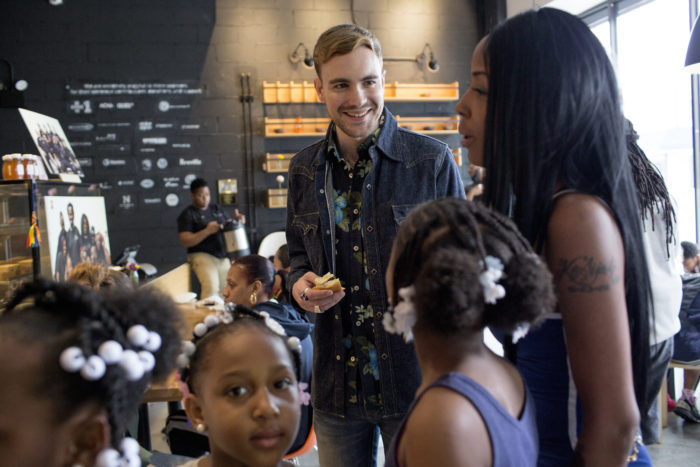
Says Denton, at center, a co-founder of the BCCC: “I want this to serve as a bulwark against gentrification, not a destination spot for foodies”
But the BCCC isn’t any conventional charity. Yes, one goal is to provide “healthy, accessible cuisine” to a profoundly underserved neighborhood. But that’s a byproduct of its most distinctive mission: to help young people create career opportunities for themselves in a community that’s been written off for years.
The BCCC offers culinary training designed to give its students a jump start in the city’s booming hospitality industry. Forty-eight participants a year go through a 40-week, apprenticeship-based program, receiving $11-per-hour stipends while they study and practice.
The program includes classroom training and “externship” opportunities with food-service partners, but the heart of the process is the students’ experience working at the BCCC’s eatery and bakery. The center’s cuisine is “inspired by the history of the African Diaspora,” which translates into such offerings as black-eyed pea falafel salad ($7), jerk-chicken gyro ($6) and fish ‘n’ grits ($7). Customers who qualify for the Supplemental Nutrition Assistance Program (SNAP) get a 50% discount.
BCCC was born out of a chance meeting five years ago in a Bedford-Stuyvesant bakery between Claus Meyer, the Danish chef of international renown, and Lucas Denton, a recent Bard College graduate who had tried out jobs ranging from ironworker to human-rights research but lately had been volunteering with substance-abuse and literacy programs in Brownsville. Meyer had created the Melting Pot Foundation, a nonprofit designed to teach cooking skills to the disadvantaged, and was looking for new places hungry for opportunity.
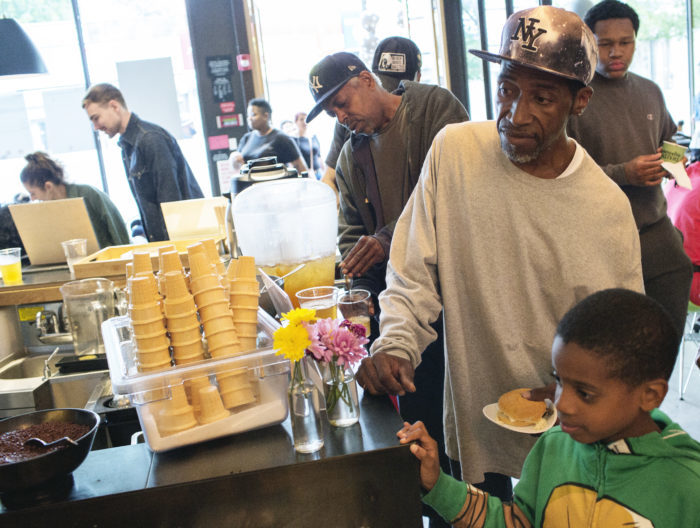
On a recent Saturday, the BCCC treated neighborhood residents like Melvin Livingston (in shiny cap) to free sliders and ice cream
Brownsville cried out, Denton told the chef. Together with Philip Hoffman, the foundation’s executive director, they launched BCCC in a 10,000 sq.-ft. storefront space in the shadow of the Hughes Apartments, one of dozens of New York City Housing Authority buildings in the neighborhood.
Denton said the intent was to create a way for people to find their own path, rather than play the role of a charity swooping in to rescue the poor, a formula he believes is ineffective in the long run. “It was important that we didn’t try to impose a grand solution to the community without its consent,” says Denton, now the foundation’s executive director of content and communications. “Gentrification was not making the improvements that people claimed it did. The purpose of founding this project was to support the existing grassroots momentum.”
Part of that momentum is a dramatic reduction in crime, a trend that hasn’t been fully reflected in the media, well as an increasingly positive self-image. But Brownsville isn’t the kind of neighborhood that is going to be buoyed up economically by the typical gentrification pattern of outsiders moving in. It has the highest density of public housing in the city, with 37% of its 86,000 residents living below the poverty line and an incarceration rate 3.5 times higher than the borough at large. The unemployment rate is 16%, nearly four times the city’s overall level.
Denton observed that over the years, well-intentioned groups had attempted a variety of charity solutions that did not result in significant change for the neighborhood. The approach of the Melting Pot Foundation is instead to help the community rebuild itself as a partner, in part by offering its classroom space for use by neighborhood groups and individuals.
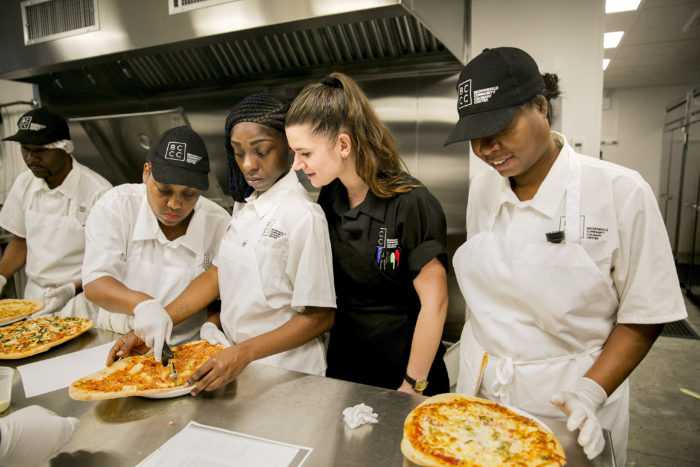
Students learned to make pizza with instructor Mette Staarup, in dark shirt (Photo by Sam Hodgson/The New York Times/Redux)
Students in the center, 80% of whom are from the local area, are engaged in the food culture of the neighborhood: largely Caribbean, African and Southern American fare. “I hope residents can celebrate and endorse their food culture,” says Denton. “It’s some of the healthiest on the planet. I want this to serve as a bulwark against gentrification, not a destination spot for foodies.”
Students at BCCC are trained in the basics of culinary work, but also introduced to a broad variety of career possibilities, says Rodney Frazier, the BCCC’s chief educator. Among his students, for example, is one who wants to work for the city in health or sanitation, while another would like to be a food writer. “You can teach anyone to cook, but we want to show how learning hospitality can improve their lives,” says Frazier. “So we give as much exposure as we can give.”
Students need to be age 18 to 34 to qualify for the program, but previous experience varies. Some applicants have jobs in other industries; others are out of work and live in shelters. The admission process is rigorous, including a meeting with a social worker. Once admitted, students take part in life-skills workshops to learn financial literary, time management and job-readiness skills.
Fatimah Horton, 28, a BCCC student who moved to Brownsville five months ago from Virginia, calls chef Frazier a “father figure” and says she wants to be a line cook and eventually an executive chef. “This is a good thing they’re doing, especially for people who may not know where they’re going, particularly in the culinary arts.”
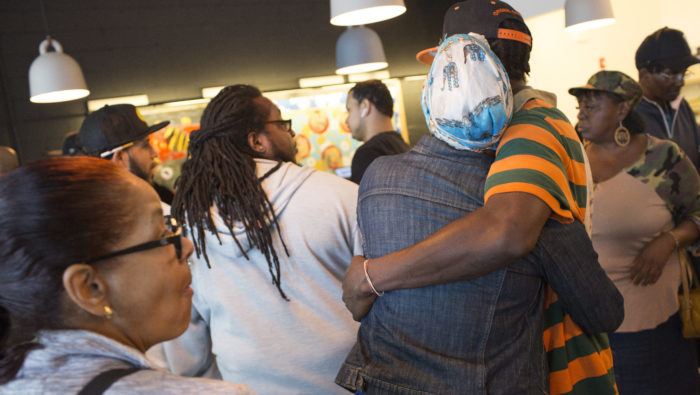
The center drew a big crowd for a Saturday celebration, but its usual hours are Monday through Friday, 7 a.m. to 3 p.m.
To launch and maintain the program, the foundation has raised $1.4 million through various sources–sponsors range from Pat LaFrieda Meat Purveyors to Con Edison–and are in search of more funding. It costs $23,000 to put a student through the 40-week program, including the stipend.
State Assemblywoman Latrice Walker, who represents the neighborhood, recently secured state funding of $120,000. The center, she says, plays a role in workforce development that could be replicated in other neighborhoods. “One of the issues we’ve had when it comes to workforce development is that we have not directed it around a concentrated industry,” says Walker. “We have always tried to get people jobs in retail or some menial work rather than doing some long-term planning. What the BCCC does is provide a skill set to individuals who might not have thought of themselves as part of the culinary industry.”
Denton believes that the program they’ve created thrives on the engagement between the community and the enterprise. “I’ve lived in a lot of places and I haven’t seen this level of participation. Every one of our participants wants to help the community,” says Denton. “My agenda as co-founder is that I’d like to see the industry be revolutionized.” Indeed, food and social justice are teaming up in another Brooklyn culinary school, Emma’s Torch in Carroll Gardens, where refugees learn to cook in a working restaurant as a pathway to employment.
As she smiled gamely while preparing to attempt a new dish in BCCC’s bakery, student Sade Walcott says that the experience has opened her eyes to parts of the business she didn’t know. “Being in the bakery has challenged me, taken me out of my comfort zone,” said Walcott, who has been cooking since she was 4. “Before I came here, I had visions of opening a restaurant, but I think I’ll take my time.”
(Video by Jay Gunning and Jeff Harris, courtesy of Brownsville Community Culinary Center)










